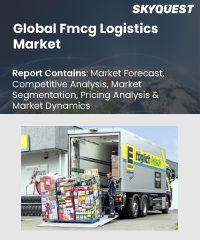
Report ID: SQMIG25AG2020
Skyquest Technology's expert advisors have carried out comprehensive research on the fmcg logistics market to identify the major global and regional market trends and growth opportunities for leading players and new entrants in this market. The analysis is based on in-depth primary and secondary research to understand the major market drivers and restraints shaping the future development and growth of the industry.
International Trade
Population Growth and Urbanization
Rising Operational Costs
REQUEST FOR SAMPLE
FMCG Logistics Market size was valued at USD 112.99 Billion in 2023 and is poised to grow from USD 117.13 Billion in 2024 to USD 156.15 Billion by 2032, growing at a CAGR of 3.66% during the forecast period (2025-2032).
The global Fast-Moving Consumer Goods (FMCG) Logistics market features a highly competitive landscape characterized by the presence of numerous established players and emerging regional providers. Key logistics companies, such as DHL, C.H. Robinson, Kuehne + Nagel, DB Schenker, and UPS, dominate the market with their extensive global networks and comprehensive service offerings. These major players constantly engage in strategic initiatives like mergers, acquisitions, and partnerships to expand their market presence and gain a competitive edge. Collaborations with FMCG manufacturers and retailers enable them to offer integrated end-to-end supply chain solutions, enhancing their value proposition. 'DHL (Germany)', 'C.H. Robinson (United States)', 'Kuehne + Nagel (Switzerland)', 'DB Schenker (Germany)', 'UPS (United States)', 'Nippon Express (Japan)', 'DSV Panalpina (Denmark)', 'XPO Logistics (United States)', 'Expeditors International (United States)', 'Ceva Logistics (Switzerland)'
The globalization of FMCG markets has led to increased cross-border trade, creating opportunities for logistics providers to offer international shipping solutions.
E-commerce Growth: The rapid expansion of e-commerce has increased the demand for efficient FMCG logistics to handle last-mile deliveries and manage higher shipment volumes.
Between 2023 and 2030, the Asia Pacific region is expected to dominate the FMCG logistics market, driven by the rising purchasing power of the middle class and lower production costs due to commercialization. China and other emerging markets are projected to experience rapid growth in value-added services, fueled by the increasing demand for expensive consumer goods and perishables that require efficient logistics management for safety and handling. Southeast Asia, in particular, is emerging as a hotbed of growth opportunities for the consumer goods market, as evidenced by SF Express, China's leading express delivery company, acquiring Kerry Logistics for USD 2.3 billion in 2021 to expand its network in the region.
Want to customize this report? This report can be personalized according to your needs. Our analysts and industry experts will work directly with you to understand your requirements and provide you with customized data in a short amount of time. We offer $1000 worth of FREE customization at the time of purchase.
Feedback From Our Clients

Report ID: SQMIG25AG2020
sales@skyquestt.com
USA +1 351-333-4748